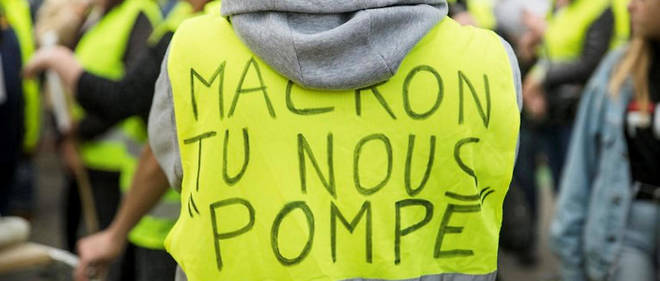‘They’d like anger that was polite and well-mannered’
Philosopher Frédéric Gros on the Gilets Jaunes protests.

Frédéric Gros, interviewed by Sonya Faur
The philosopher Frédéric Gros sees the elites as amazed by the heterogeneous and unprecedented nature of the gilets jaunes mobilization. According to him, the existence of a certain degree of violence must be accepted.
In his latest book, Disobeying (Verso, 2020), Frédéric Gros sought the reasons for our passivity in the face of an increasingly unequal world. Today, a section of the population are protesting and Gros, a philosopher and professor at Sciences-Po, analyses the unprecedented expression of anger by the gilets jaunes.
Both as employees and retirees, the gilets jaunes sometimes display violence in their words or actions. How do you explain that?
There is first of all a portion of violence emanating from a minority of vandals or small groups wanting to ‘fight it out’. That is indisputable, but we must understand how it causes both emotional fright and intellectual relief at the same time. This is familiar ground. The real problem is that it is the violence of a minority. It is the froth of a wave of anger that is immense and popular, transversal. We keep hearing the same speech from political ‘leaders’: ‘Anger is legitimate, we understand it; but nothing can justify violence.’ They would like anger that was polite and well-mannered, that presented a list of grievances and thanked the political world for taking the time to consult it. They would like anger without its expression. We must accept the existence of a certain degree of violence that is not the product of choice or calculation; it is impossible even to apply the criterion of legitimate versus illegitimate, since it is the pure expression of exasperation. This is a revolt of ‘that’s enough’, of ‘fed up to the back teeth’. Every government gets the violence it deserves.
Is what seems violent not also the fact that this movement does not follow the usual forms of protest?
The heterogeneous and disparate nature of the mobilization produces unease: it makes it impossible to stigmatize a group and put things in comfortably Manichean terms. It has produced astonishment on the part of intellectual and political ‘elites’. Not just that they fail to understand anything, but, above all, they are challenged in their capacity as representatives, in the comfortable certainty of their legitimacy. Their only way out at the present time, if they fail to question their own responsibility, is for them to demonize this movement and denounce it as crypto-fascist. This enables them to adopt the position of defenders of democracy in peril, a rampart against barbarism, giving themselves once more a heroic role.
Is this form of disobedience dangerous, this violent questioning of intermediate bodies and representative democracy?
The risks are great and this spontaneity represents a real social and political danger. But we should not pin the blame for the crisis of democratic representation on those at the losing end of policies that have followed the same direction for thirty years. We are paying for the systematic destruction of public goods during these ‘thirty disastrous years’: the violence of social plans, the lack of a future for the new generations, the mad pursuit of a ‘modernization’ expressed in the downward slide of the middle classes. The only thing we can be sure of, unfortunately, is that it is the most vulnerable who will suffer from excesses or backlash.
You have written on the notion of security;[1] what do you think of the state’s response after the demonstrations and the damage?
We hear on all sides the same speech from the police: ‘This is totally new, we have never seen such a wave of violence, such brutality.’ This emphasis on ‘novelty’ should not be used as a screen for increased repression.
In your recent book, Disobeying, you analysed the roots of our ‘passivity’. What happened to make the gilets jaunes abandon the ‘comfort’ of conformity?
Our political obedience is essentially based on the conviction that revolt is useless: ‘What’s the point?’ Then comes the unpredictable, incalculable moment of a tax too much, an unacceptable measure. These moments when people are jolted out of the rut are too deeply historical to be predictable. They are moments when fear turns into anger. New forms of solidarity are invented, a political joy is experienced whose taste we had forgotten, and we discover that we can disobey together. It is a fragile promise that can turn into its opposite. But you can’t lecture people who, with their bodies, with their time, and with their voices, proclaim that another policy is possible.
Are we in a great moment of collective disobedience?
Yes, a disobedience that has its own exasperation as a firm foothold. Everything has been done over the past thirty years to depoliticize the masses, to suborn intermediate bodies, to discourage critical reflection, and today they are surprised to see a movement without clear political direction and rejecting any leadership. This disobedience is a profound testimony to our times. It is a priority task to sound out the actors involved.
Originally published by Libération. Translated by David Fernbach
[book-strip index="1" style="display"][1] Frédéric Gros, The Security Principle, Verso 2019.

